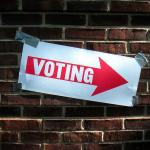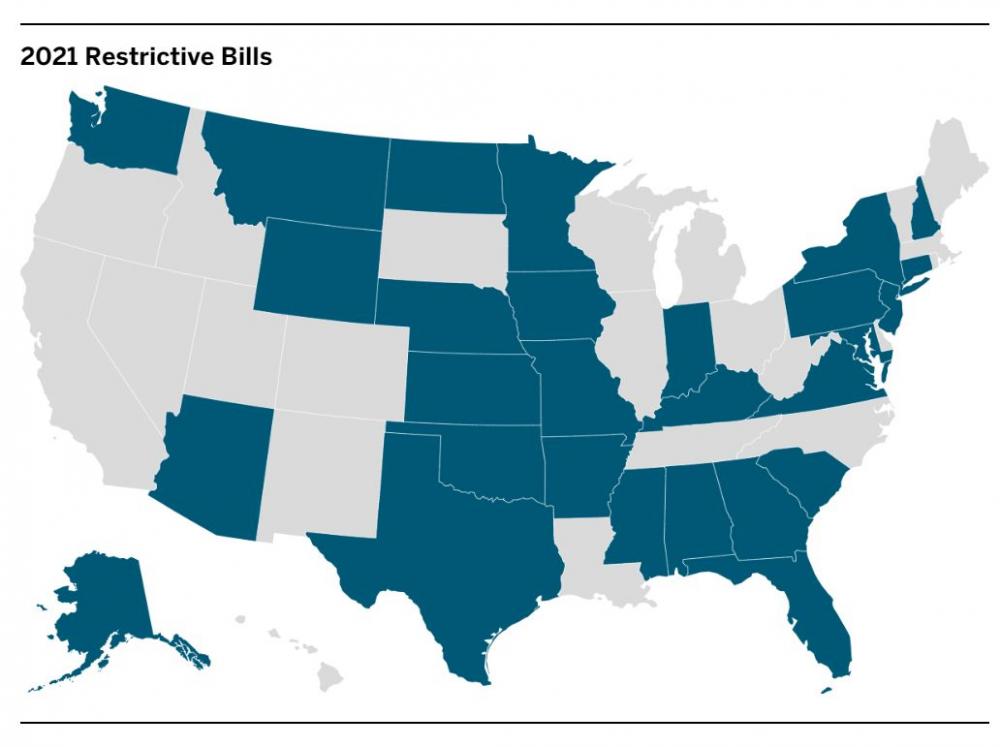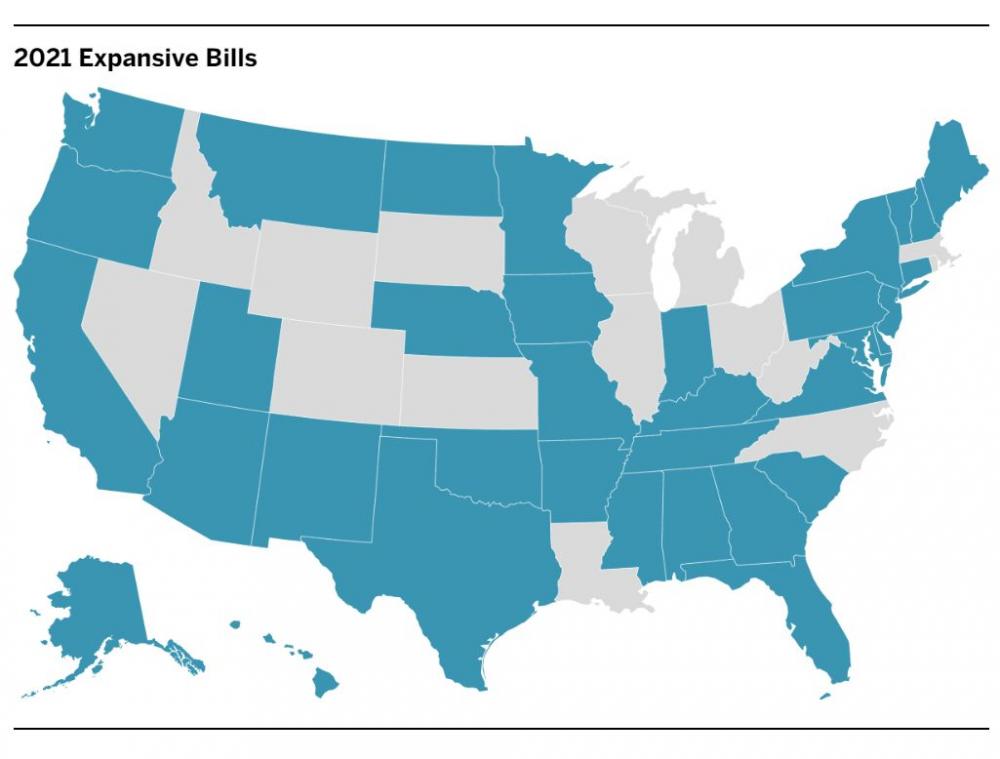Voting Laws Roundup 2021

The 2021 legislative sessions have begun in all but six states, and state lawmakers have already introduced hundreds of bills aimed at election procedures and voter access — vastly exceeding the number of voting bills introduced by this time last year.
In a backlash to historic voter turnout in the 2020 general election, and grounded in a rash of baseless and racist allegations of voter fraud and election irregularities, legislators have introduced three times the number of bills to restrict voting access as compared to this time last year. Twenty-eight states have introduced, prefiled, or carried over 106 restrictive bills this year (as compared to 35 such bills in fifteen states on February 3, 2020).
Of course, other state lawmakers are seizing on an energized electorate and persistent interest in democracy reform (which is likewise reflected in Congress). To date, thirty-five states have introduced, prefiled, or carried over 406 bills to expand voting access (dwarfing the 188 expansive bills that were filed in twenty-nine states as of February 3, 2020). Notably 93 such bills were introduced in New York and New Jersey.
With unprecedented numbers of voters casting their ballots by mail in 2020, legislators across the country have shown particular interest in absentee voting reform, with more than a quarter of voting and election bills addressing absentee voting procedures. Only seven of the forty-one states that have introduced election bills have not proposed policies to alter absentee voting procedures in some way.
Also in reaction to 2020, four states have proposed legislation that would modify how presidential electors are allocated, and eleven states have introduced bills to adopt the national popular vote compact.
Overview of Restrictive Bills
Thus far this year, 28 states have introduced, prefiled, or carried over 106 bills to restrict voting access. These proposals primarily seek to: (1) limit mail voting access; (2) impose stricter voter ID requirements; (3) limit successful pro-voter registration policies; and (4) enable more aggressive voter roll purges. These bills are an unmistakable response to the unfounded and dangerous lies about fraud that followed the 2020 election.
Pennsylvania leads the nation in proposed voter suppression legislation in 2021, with 14 restrictive policy proposals. New Hampshire comes in second (11 bills), followed by Missouri (9 bills), and Mississippi, New Jersey, and Texas (8 bills each). Georgia lawmakers reportedly plan to introduce bills to require an excuse to cast an absentee ballot, mandate photo ID when returning an absentee ballot, and ban ballot drop boxes, among other harsh restrictions.

1. Restrictions on Mail Voting
More than a third of restrictive bills introduced this year seek to limit mail voting. Legislators are taking aim at mail voting at every stage, with proposals to circumscribe who can vote by mail, make it harder to obtain mail ballots, and impose hurdles to complete and cast mail ballots.
Limiting who can vote by mail: Five bills in three states footnote1_btwus961 would make the "excuse" requirement more stringent for absentee voting or eliminate “no excuse” mail voting. The Missouri bill, for example, would eliminate Covid-19 concerns as an excuse (MO SB 282), while three different proposals in Pennsylvania seek to eliminate no-excuse mail voting, a policy just adopted in 2019.
Making it harder to obtain ballots: Arizona (HB 2370) and Pennsylvania have introduced bills that would eliminate the permanent early voter list. Two bills in Arizona (AZ SB 1069, AZ HB 2560) and one in New Jersey (NJ AB 4626) would make it easier for officials to remove voters from the permanent absentee list. In addition, New Jersey, Pennsylvania, Texas, and Washington are considering bills to limit who can send absentee ballot applications to voters without an affirmative request. A New York bill (NY SB 1805) would restrict who can submit absentee ballot applications on another voter’s behalf.
Barriers to completing or casting ballots:
- Restrictions on assistance to voters: A single Arizona bill would further restrict who can assist voters in collecting and delivering mail ballots (existing policy already limits such assistance to family and household members), add a voter ID requirement for turning in mail ballots in person, and require all mail ballots to be notarized (AZ HB 2369). Legislators in Alaska, Kansas, Kentucky, and Maryland have proposed bills to strictly limit who can assist in returning a voter’s ballot, while a South Carolina bill would impose a photo ID requirement for anyone returning another person’s absentee ballot (SC HB 3525).
- Witness signatures: Four states footnote2_yp0nh8d2 have introduced legislation to make it harder to satisfy existing witness requirements. Arizona’s bill would also require all mail ballots to be notarized. South Carolina’s bill would require a witness to include their driver’s license or state voter registration number, and Virginia’s bill would ask witnesses to print their name and provide their residential address. The Alaska proposal states that if a court invalidates the witness signature requirement because of a state of emergency, the requirement goes back into effect after the emergency declaration expires (AK SB 39).
- Limitations on absentee ballot return options: A Virginia bill would prohibit absentee ballots from being returned to any location except the office of the general registrar, thus precluding the use of ballot drop boxes (VA SB 1459).
In addition to restrictions targeting voters, other bills have proposed limits on ballot counting:
- More burdensome signature matching requirements. In South Carolina, where a federal court had enjoined signature matching before the November 2020 election, proposed legislation would affirmatively impose a signature matching requirement for absentee ballots. Likewise, in Pennsylvania — where the state supreme court ruled that ballots could not be rejected based solely based on mismatched signatures — a proposal would require rejection of absentee ballots on that basis unless the perceived mismatch is cured within six days of notification.
- Increased poll watcher access. At least two states, New Hampshire and Pennsylvania, have introduced legislation to increase poll watcher access to absentee ballot processing and canvassing activities. New Hampshire’s bill would require that members of the general public be permitted to observe “without obstruction.”
- Ballot receipt & postmark deadlines. Three states have introduced bills that would require that mail ballots be received earlier in order to be counted. A Kansas bill would eliminate the secretary of state’s discretion to count ballots received later than three days after election day (KS SB 35). In response to the Pennsylvania Supreme Court’s decision permitting the counting of timely-postmarked ballots received within three days of election day, one proposal would require all ballots not received by election day to be rejected and seeks to prohibit modification of that rule by court order. In Iowa, where absentee ballots must be postmarked by the day before election day, a new bill would require voters to mail their ballots at least ten days before election day (IA SF 115).
2. Stricter Voter ID
Legislators in 10 states have introduced 18 bills to impose new or more stringent voter ID requirements for in-person voting (either for early voting or election day).
- In six states that do not require voters to present ID at the polls, legislators have introduced bills to impose that requirement. footnote3_fxd4u1f3
- Three bills in Missouri and New Hampshire would institute stricter voter ID requirements for early in-person voting.
- Two states with existing voter ID requirements, Mississippi and New Hampshire, are considering bills to eliminate the use of certain forms of ID. The Mississippi bill would prohibit the use of out-of-state drivers’ licenses, while the New Hampshire bill would prevent the use of student IDs (NH HB 429, MS HB 543).
- New Hampshire has also introduced a bill that would require voters to include a photocopy of their photo ID with their absentee ballot applications and their completed mail ballot (NH SB 54).
3. Limiting Voter Registration Access
- Mississippi and New York legislators have both introduced bills requiring voters to produce proof of citizenship in order to register to vote (MS SB 2254; NY SB 1853). Meanwhile, Texas introduced a bill stripping voter registration authority from county clerks and requiring the secretary of state to send voter registration information to the Department of Public Safety for citizenship verification (TX HB 1026).
- Seven bills have been introduced to rollback or limit opportunities for election day registration, with legislators in four states introducing bills to eliminate election day registration entirely. footnote4_okjt2944
- Alaska legislators have introduced bills to roll back automatic voter registration by eliminating opt-out registration from the state’s permanent fund dividend application system (AK SB 39, AK HB 23).
4. More Aggressive Voter Purge Practices
Six states have introduced 13 different bills that would expand voter roll purges or adopt flawed practices that would risk improper purges. For example, three bills in Mississippi would require a comparison of the voter rolls against other databases to identify noncitizens, and would require removal from the rolls of voters who fail to respond to a notice within 30 days with proof of citizenship (MS HB 4, MS SB 2588, MS SB 2577). A New Hampshire bill (NH SB 31) would permit election administrators to remove voters from the rolls based on data provided by other states, a practice that federal courts have found violates the National Voter Registration Act.
Overview of Expansive Bills
State legislators are also proposing policies to expand access to voting. Indeed, of the 41 states with new election bills, 35 states have introduced expansive policies, for a total of 406 expansive bills introduced or carried over into 2021. These bills focus primarily on: (1) mail voting; (2) early voting; (3) voter registration; and (4) voting rights restoration.
Many of these-pro voter reforms have been introduced in states like New York (with 56 expansive bills) and New Jersey (with 37). But a significant number of these proposals have been introduced in states with histories of voter suppression, including Mississippi (39 bills), Missouri (21 bills), and Texas (53 bills) — suggesting that there remains concerted energy around policies that make voting easier, even if passage will be an uphill battle politically.

1. Mail Voting
A substantial plurality of bills that expand access relate to mail and absentee voting, with many policies aimed at addressing the challenges that voters and election officials encountered in 2020.
- Twenty-seven bills in eleven states would permit all voters to vote by mail in all elections (eliminating the excuse requirement). footnote5_bh7tmcs5 This would make permanent the expansive policies that most of these states — except Indiana, Mississippi, and Texas — temporarily adopted in 2020 to facilitate mail voting access during the pandemic.
- Twenty bills in 12 states would create or reform the notice and cure process to ensure that voters who make a technical mistake on their mail ballots get a chance to remedy those errors. footnote6_54yspxy6
- Thirteen bills in eight states affirmatively authorize or require local officials to provide mail ballot drop boxes. footnote7_lkpc3wt7 Drop boxes were the subject of 35 cases litigated in 2020, most of which involved petitioners seeking to authorize or expand the use of drop boxes, while others claimed that state law did not authorize their use.
- Nine bills in seven states would extend the mail ballot receipt or postmark deadline. footnote8_16p62108
- Nineteen bills in 13 states would allow election officials to start processing mail ballots before election day, which would speed up initial reporting on election results. footnote9_2wkpy379
2. Early Voting
Reflecting a similar interest in offering voters more flexibility, lawmakers in 14 states have proposed expansions to early voting, which would ease election day burdens on voters and election administrators alike. footnote10_3bmwynf10
- Twenty four bills would implement early voting for the first time. footnote11_ugdp6qw11
- Seven bills would enlarge an existing early voting period. footnote12_akgjewn12
- Eight bills would increase the number of early voting sites. footnote13_4sb99wo13
3. Easing Voter Registration
States are also looking for ways to make it easier for voters to get registered.
- Thirteen states have introduced bills to implement same-day registration, which would allow voters to register and cast their ballots on the same day, including election day. footnote14_6ajtiea14
- Nineteen states and the District of Columbia have adopted automatic voter registration in the last six years. Eleven states have introduced bills this year that, if enacted, would enable them to join this group. footnote15_zqr0zod15
- Legislators in Mississippi, Oklahoma, and Texas have introduced bills to allow voters to register to vote online.
4. Rights Restoration
Momentum continues in support of restoring voting rights to individuals with past convictions. Last year, California voters overwhelmingly passed a constitutional amendment to restore voting rights to everyone in the community and Iowa’s governor issued an executive order that ended the state’s policy of permanent disenfranchisement for those with felony convictions.
This year, 15 states have introduced policies to restore voting rights or ease current restrictions for people with past convictions. footnote16_02d4ann16 Legislators in Mississippi have introduced 12 such bills to expand or restore voting rights. The Sentencing Project estimates that Mississippi disenfranchises over 214,000 citizens living in the community — more than 54 percent of whom are Black — because of past convictions.
***
In addition to state bills, much attention has been directed to the comprehensive set of democracy reforms laid out in the For the People Act (H.R. 1 in the House of Representatives and S. 1 in the Senate), as well as the John Lewis Voting Rights Advancement Act.
Consistent with these efforts, New York and Virginia have introduced state voting rights acts (NY SB 1046, VA HB 1890).
Allocating Presidential Electors
One obvious area of focus for legislatures this year is the manner in which presidential electors are allocated. Currently, only two states — Nebraska and Maine — allocate electors by congressional district on a proportional basis, while the remaining 48 states allocate electors using a winner-take-all system.
Four bills seek to alter these approaches. The Nebraska legislature, for example, has introduced a bill (NE LB 76) to allocate electors using the winner-take-all system. This follows a split of Nebraska’s electoral college votes in the 2020 presidential election,
By contrast, a Wisconsin proposal (WI LRB 0513/01) would allocate electors by district (effectively adopting the current Nebraska model), while a Mississippi bill would appoint presidential electors by district, with two electors chosen at large (MS HB 1183).
An Oklahoma bill seeks to have the state legislature choose presidential electors unless and until there is a federal law requiring voter ID and auditable paper ballots (OK SB 33).
Eleven states have introduced proposals to adopt the national popular vote interstate compact, under which participating states would allocate their electoral votes to the presidential candidate who wins the national popular vote. footnote17_y4usndi17 The agreement would go into effect only if participating states represent an absolute majority of electoral college votes. Maryland has introduced a bill to remove itself from the compact (MD HB 544).
Endnotes
- footnote1_btwus96
1
PA, MO, ND.
- footnote2_yp0nh8d
2
AK, AZ, SC, VA.
- footnote3_fxd4u1f
3
MN, NE, PA, VA, WA, WY.
- footnote4_okjt294
4
CT, MT, NH, VA.
- footnote5_bh7tmcs
5
AL, CT, DE, IN, KY, MO, MS, NH, NY, SC, TX.
- footnote6_54yspxy
6
AZ, CT, HI, IN, KY, MS, MO, NJ, NY, TX, VT, VA.
- footnote7_lkpc3wt
7
IN, KY, MD, NJ, NY, TN, TX, VA.
- footnote8_16p6210
8
FL, MD, NJ, NY, OR, TX, UT.
- footnote9_2wkpy37
9
AR, CT, IN, KY, MD, ND, NH, NJ, NY, OR, PA, SC, VA.
- footnote10_3bmwynf
10
AL, AZ, CT, IN, KY, MD, MO, MS, NY, PA, SC, TN, TX, VA.
- footnote11_ugdp6qw
11
AL, CT, KY, MO, MS, PA, SC.
- footnote12_akgjewn
12
AZ, IN, MD, NY, TX, VA.
- footnote13_4sb99wo
13
IN, NY, TN.
- footnote14_6ajtiea
14
AK, DE, FL, IN, KY, MS, MO, NJ, NY, OR, PA, SC, TX.
- footnote15_zqr0zod
15
FL, HI, IA, IN, KY, MO, MS, NE, OK, PA, TX.
- footnote16_02d4ann
16
AL, CT, IA, KY, MD, MS, MO, NE, NM, NY, OR, TN, TX, VA, WA.
- footnote17_y4usndi
17
IA, FL, KS, MS, MN, MO, PA, SC, TX, VA, UT.
Defend Our Democracy. The Brennan Center for Justice fights to make elections fair, end mass incarceration, and preserve our liberties — in Congress, the states, the courts, and the court of public opinion. Join The Brennan Center in building an America that is democratic, just, and free.
